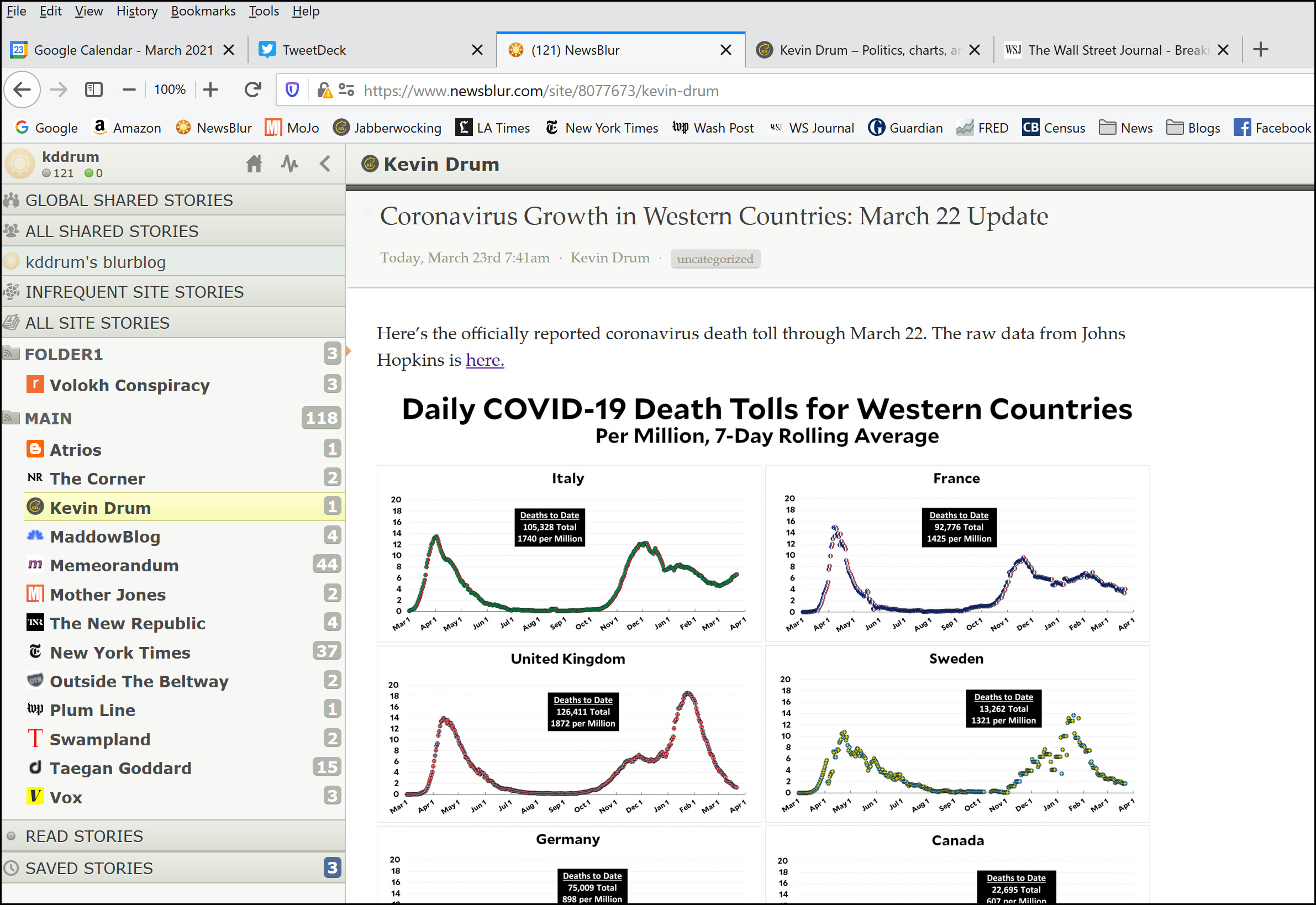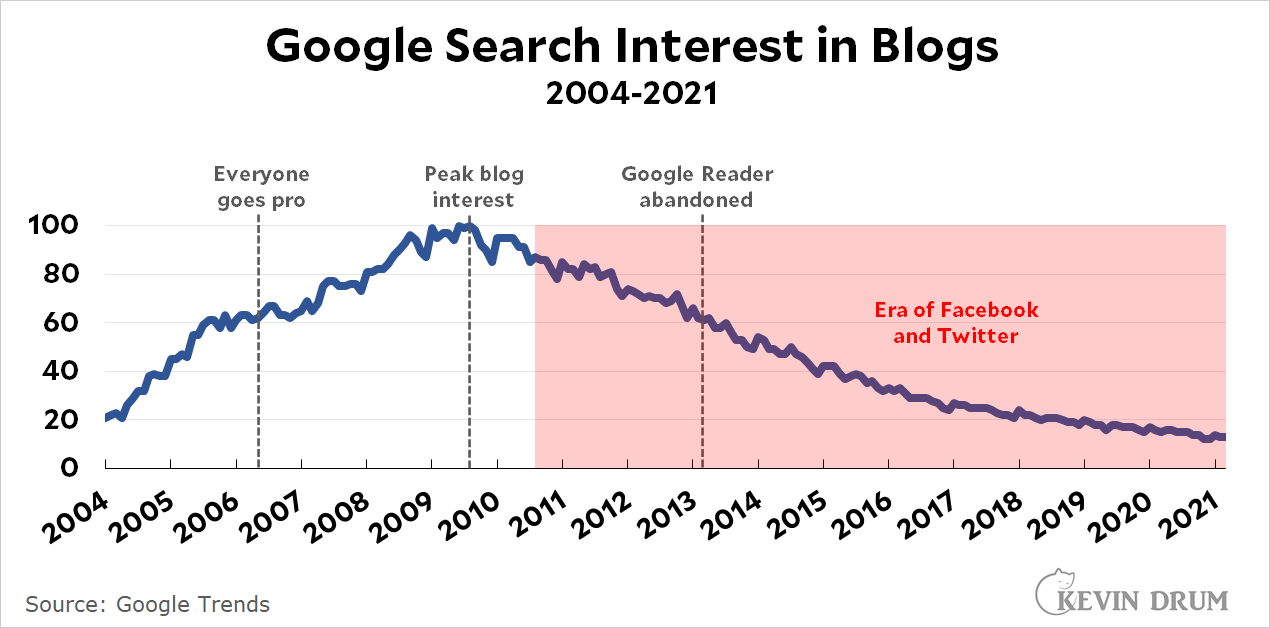The golden age of blogs is long behind us, and there's a school of thought that blames Google for this. Specifically, it blames Google for cancelling Google Reader, the app that nearly everyone once used to read blogs.
For some of you, that paragraph makes perfect sense. For others, it might as well be in Greek. So let me explain as briefly as possible.
All blogs, including this one, have an RSS feed. RSS is an independent standard that broadcasts the text of a blog (and other forms of web content) in a common format. An RSS reader is an app that pulls in that content and displays it. After the death of Google Reader I switched to NewsBlur, which looks like this:

I use NewsBlur only for blog reading, but there are plenty of other things you can also use it for. As you can see, it keeps track of all the blogs I've told it about and tells me if any of them have new posts since the last time I checked. This is very handy since it means I don't have to scroll through all of them periodically just to see if they've posted anything new.
Anyway. As I said, Google Reader was the de facto standard for reading blogs back in the day, and there was much weeping and gnashing of teeth when it was canceled. But was that responsible for a decline in blog audiences?
I asked that question on Twitter yesterday, and the consensus was "Meh. Maybe." But people also pointed to other things. There was the period when many of the most popular bloggers turned pro. There was the upswing in social media, especially Facebook and Twitter. Maybe those were more at fault.
This got me curious in a navel-gazing sort of way. So in bloggy fashion, I went to Google Trends to extract some data that might or might not be a good proxy for blog popularity. Here's a chart showing Google searches for the topic "blog" since 2004:

If we assume that this really does represent blog popularity, we can say a few things about the decline that started in 2009. First, my recollection is that the peak years for bloggers turning pro was around 2005-07. But blog popularity continued to increase for several years after that. So that's probably not the cause of the decline.
Google Reader is an even worse fit. Blog popularity had already been on a downswing for more than three years when Google canceled it in 2013. It obviously can't have been the initial cause of the decline.
Social media is harder to get a handle on. Twitter is an unlikely villain for a downturn that began in 2009, since Twitter just wasn't that popular back then. Facebook, however, fits pretty well and provides a platform for blog-length musings. It's clearly a candidate.
But you can't look at this chart without noticing one other thing: The decline in blog popularity starts almost precisely when George W. Bush left office. It was Bush and the Iraq war that popularized blogs in the first place, so it would be sort of poetic if his departure marked the beginning of the end for blogs. Maybe blogs just lost their mojo when their favorite punching bag flew home to Texas.
Or it might just be a coincidence. Personally I find Facebook the most likely culprit.
But there's one other question left hanging: Google Reader might not have been responsible for the initial decline of blogs, but why was it canceled? It was a pretty low maintenance product and could have easily been kept around. Nobody at Google would even have noticed it. In a similar vein, Facebook and Twitter have reduced their support for RSS even though it requires very little effort to maintain. Why?
The most likely answer to all these questions is that RSS broadcasts content directly to users. There's no way to monetize it, and it cannibalizes users away from platforms that want to be your sole hub for news aggregation. Google wanted its users on Google+, or at the very least finding the news via search, which generated ad revenue. Facebook wanted you to read a news feed full of ads within their walled garden. And Twitter wanted to be the place where news broke first—but only if you were actually on Twitter.
In other words, RSS was a threat to practically every platform that aggregates news since it allowed users to decide for themselves what news they wanted to see—and to see it without passing through a gatekeeper. The best way to eliminate this threat was to eliminate or reduce support for RSS, as Google, Facebook, and Twitter have all done.
Blogs were just collateral damage here. An RSS reader is the only decent way to read a collection of blogs, and with the demise of RSS and Google Reader it became more difficult to follow blogs. Sure, lots of people switched to a different reader, but lots more didn't know how or just never got around to it. And with that, the decline in blog readership accelerated. This was the start of a vicious cycle that opened up opportunities for Twitter, Medium, YouTube, podcasts, Substack, and other platforms that increasingly replaced blogs as the place for web-centric conversation.
Maybe. It's a plausible story, anyway. I just don't know for sure if it's true.

Trolls and spam might have also played a role. It takes a fair bit of effort to police a comments thread.
What blogs offer is a chance in some cases to actually interact with the provider of content. Smart people writing thoughtful pieces with informed interaction with an interested public is a great thing. But have you ever visited free-for-all comment spaces? Horrible. But maintaining a quality audience that is small enough to be manageable is not a paying proposition for many. And then there is the time spent reading comment threads. You have to limit yourself to a few blogs. So most blogs will have to be amateur. But hey, I'm retired now, I have time for my hobbies.
I guess I am just an antique. I follow this blog and about 60 others (OK less because quite a few are no longer posting) using NewsBlur. If there were no RSS feed I would not follow any of them. I have a few friends whose blogs automatically post a link to FaceBook in addition to having an RSS feed. I almost always see their posts in NewsBlur before FaceBook and often only there because Facebook has too much noise and algorithms that are incorrectly trying to filter what it thinks I am interested in.
RSS accounts and Apple News account for at least 90% of my online reading with about 5% each for FaceBook and miscellaneous. I group Apple News and RSS together because the experience is very similar and for quite a few sites, for example Mother Jones, I switch back and forth between the two depending upon whether I happen to be on my iPad or my computer.
For what it's worth, I just added your blog to my RSS reader, NetNewsWire on macOS. Thanks for having an RSS feed.
For what its worth, You & Atrios were the only 'political' blogs I followed regularly, starting in about 2002? I would read others mostly thru yours and Duncans links. I knew the players, but you and Eschaton were the only ones in my bookmarks. Still are.
Sorry I came on to the tail end of this one, so let me know it someone else hasn't already said it better: Because in that 'way back hypothetical school that we all went to, in different places, had a thing for the five-paragraph essay, a rather constrained but useful writing form. Blogs are ideally suited to that format -- IMHO, of course -- but different writing styles and writing forms have come to dominate in the last fifteen to twenty years.
This hypothetical school we all went to in different places might also explain part of the blogging afficionado's age profiles 🙂
Something else just occurred to me when I look at my own behavior, and the general stats seem to back it up: Podcasts have grown a lot over the same period.
Maybe blogs haven't really declined at all, but have just shifted to being a mostly audial medium.
The decline of blogs lags it a bit, but I'd blame the rise of YouTube and all the other online video sources (and the bandwidth to watch it all). Naturally hypnotic, especially with automatic recommendations...
Pingback: BRIEFLY NOTED: For 2021-03-24 We - Enri$hed Feed
Pingback: BRIEFLY NOTED: For 2021-03-24 We
Pingback: March 26, 2021: My Weekly Roundup of Web Design and Development News
Pingback: BRIEFLY NOTED: For 2021-03-24 We – The Providence Times